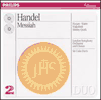The Oratorio You Thought You Knew
- Christopher Hogwood/The Academy of Ancient Music with the Choir of Christ Church Cathedral, Oxford : Handel: The Messiah (1754 version)
- Colin Davis/The London Symphony Orchestra and Chorus: Handel: The Messiah
In this rather spiritually intense time, with Passover upon us and Lent drawing to its conclusion, choral works are presented once more in the houses of worship, the concert halls, and perhaps what portion of the airwaves is left to classical music. The chances are good that at some moment in the coming week or so you'll encounter a solo or a chorus from Handel's Messiah. But even that seemingly ubiquitous and familiar work is no more a static thing than is the human brain's concept of God.
More years ago than I'd care to admit, at just this season of the year, I found myself in Dublin, bunking in a downright Dickensian youth hostel in a city that gave little hint of the economic boom far in the future . On my to-do list was a visit to St. Michan's Church, where I joined the other tourists, including two small and apparently fearless Irish kids, on a trip into its famous crypt containing the mummified remains of a nun, a Crusader, and other permanent residents.
But quite apart from these ghoulish goings-on, our guide filled us in on St. Michan's place in musical history, given that it contains an 18th century organ on which George Frideric Handel played. And whether Handel actually composed parts of his most famous oratorio at St. Michan's or merely used it as a practice site -- and there are conflicting accounts -- Dublin itself nevertheless had its role in the story of The Messiah and indeed was the site of the premiere.
The Dublin version was hardly the last incarnation (if I may use that term) of The Messiah. This work has been reshaped and reworked, with both shrinking and expanding choruses and orchestras over the years, to both glorious and cringe-worthy effect.
Which brings us to our dilemma of the week: If you can only buy one complete version of The Messiah, how do you decide among the array of recordings? As it happens, there are two interesting interpretations floating about Olsson's these days, both worthy of a look, though different in approach:
- Colin Davis's recording with the LSO, where the soloists are Heather Harper, Helen Watts, John Shirley-Quirk, and John Wakefield.
- Christopher Hogwood's seminal recording with the Academy of Ancient Music, in which Judith Nelson, Emma Kirkby, Carolyn Watkinson, Paul Elliott, and David Thomas take the solos.
 Davis opts for a modern orchestra, which provides a beauteous setting for the soloists and mixed choir, never overwhelming the listener. It is reverent, measured, gracious.
Davis opts for a modern orchestra, which provides a beauteous setting for the soloists and mixed choir, never overwhelming the listener. It is reverent, measured, gracious. Hogwood, on the other hand, uses the 1754 version of the work, employs a period ensemble and the all-male choir of adults and young boys, producing a more intimate and historically accurate effect. I should note as well that a bass solo, "But who may abide," is here sung by a soprano!
Hogwood, on the other hand, uses the 1754 version of the work, employs a period ensemble and the all-male choir of adults and young boys, producing a more intimate and historically accurate effect. I should note as well that a bass solo, "But who may abide," is here sung by a soprano!So which should you choose?
I must admit I greatly prefer Davis's adult sopranos to the trebles in the Hogwood recording. While that's very much rooted in my preference for the richer sound of the adult female voice, I would submit that with "The Hallelujah Chorus," it makes a great deal of difference, particularly in terms of dramatic power and balance.
But if I enjoy the mixed chorus on the Davis recording, I find the soloists on Hogwood's recording particularly affecting. Emma Kirkby, best known for her lengthy and distinguished career in early music, shines here, and I was delighted with the tone and delivery of the primary soprano soloist, Judith Nelson. Our tenor and bass, Elliott and Thomas, are no less deserving of praise.
Both recordings provide ample drama and energy, to say nothing of sufficient reverence and emotion. I must confess to a decided affection for the Davis recording, but the Hogwood CD is such a shining accomplishment that I can scarcely dismiss it.
Besides, as a friend of mine said when confronted with two equally tempting choices, "Can't we have both?"




0 Comments:
Links to this post:
Create a Link
<< Home